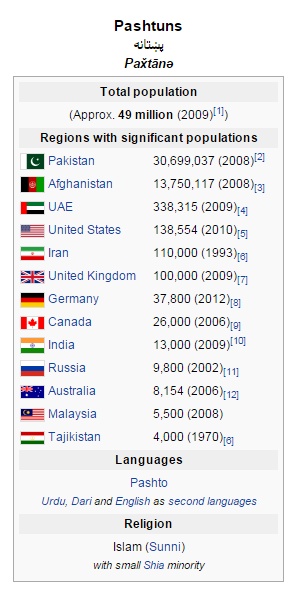The Pashtuns /ˈpʌʃˌtʊnz/ or /ˈpæʃˌtuːnz/ (Pashto: پښتانه Pax̌tānə; singular masculine: پښتون Pax̌tūn, feminine: پښتنه Pax̌tana; also Pakhtuns), historically known by theexonyms Afghans (Persian: افغان, Afğān)[13][14][15][16] and Pathans (Hindi-Urdu: पठान, پٹھان, Paṭhān),[17][18] are an ethnic group with populations in Afghanistan andPakistan.[19] They are generally classified as Eastern Iranian who use Pashto language and follow Pashtunwali, which is a traditional set of ethics guiding individual andcommunal conduct. The origin of Pashtuns is unclear but historians have come across references to various ancient peoples called Pakthas (Pactyans) between the 2ndand the 1st millennium BC,[20][21] who may be their early ancestors. Often characterised as a warrior and martial race, their history is mostly spread amongst various countries of South and Central Asia, centred on their traditional seat of power in medieval Afghanistan.
During the Delhi Sultanate era, the Pashtun Lodi dynasty replaced the Turkic rulers in North India. Some ruled from the Bengal Sultanate. Other Pashtuns fought theSafavids and Mughals before obtaining an independent state in the early-18th century,[22] which began with a successful revolution by Mirwais Hotak followed by conquests of Ahmad Shah Durrani.[23] The Barakzai dynasty played a vital role during the Great Game from the 19th century to the 20th century as they were caught between the imperialist designs of the British and Russian empires. Pashtuns are the largest ethnic group in Afghanistan and ruled as the dominant ethno-linguistic group for ov er 300 years.
er 300 years.
Many members have left their native land to other parts of the world where they achieved international fame. Abdul Ahad Mohmand journeyed into outer space in 1988, spending nine days aboard Mir space station, the first Afghan and 4th Muslim to do so. Zalmay Khalilzad became the first Muslim and first Afghan to become andambassador of the United States. Others rose to high-ranking officials at the World Bank, the United Nations and other international organizations. Malala Yousafzaibecame the youngest ever Nobel Peace Prize recipient in 2014.
They are also an important community in Pakistan, which has the largest Pashtun population, and constitute the second-largest ethnic group, having attained presidencythere and high rankings in sports. They are the world's largest (patriarchal) segmentary lineage ethnic group. According to Ethnologue, the total population of the group is estimated to be around 50 million[1] but an accurate count remains elusive due to the lack of an official census in Afghanistan since 1979. Estimates of the number ofPashtun tribes and clans range from about 350 to over 400.



